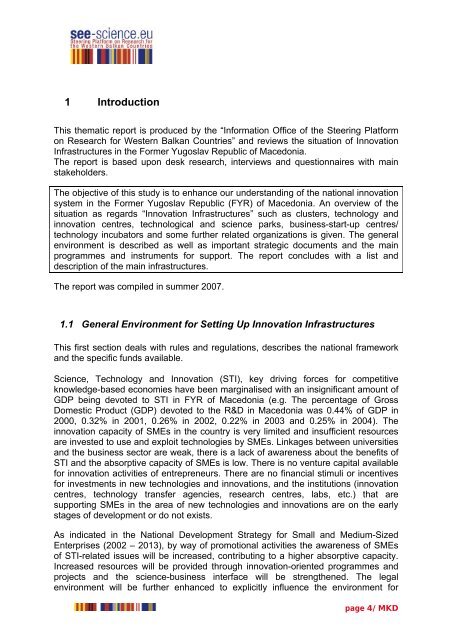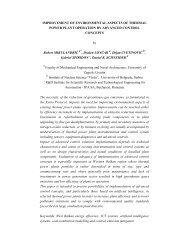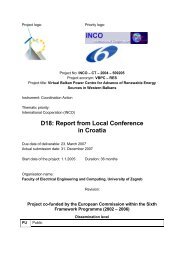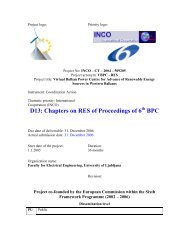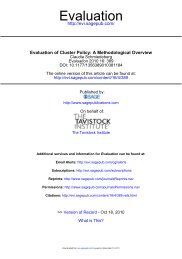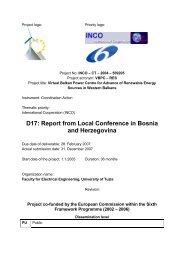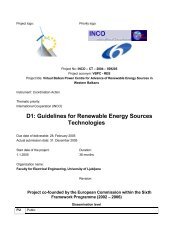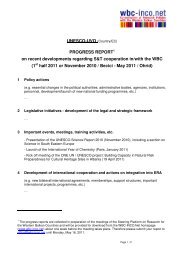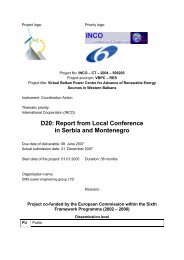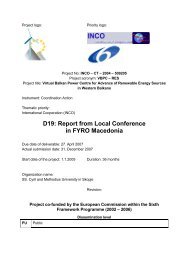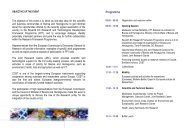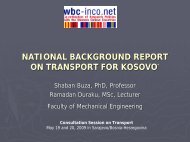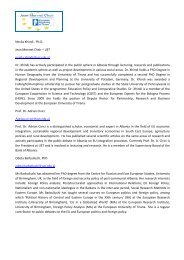S&T Country Report - Albania - WBC-INCO Net
S&T Country Report - Albania - WBC-INCO Net
S&T Country Report - Albania - WBC-INCO Net
Create successful ePaper yourself
Turn your PDF publications into a flip-book with our unique Google optimized e-Paper software.
1 Introduction<br />
This thematic report is produced by the “Information Office of the Steering Platform<br />
on Research for Western Balkan Countries” and reviews the situation of Innovation<br />
Infrastructures in the Former Yugoslav Republic of Macedonia.<br />
The report is based upon desk research, interviews and questionnaires with main<br />
stakeholders.<br />
The objective of this study is to enhance our understanding of the national innovation<br />
system in the Former Yugoslav Republic (FYR) of Macedonia. An overview of the<br />
situation as regards “Innovation Infrastructures” such as clusters, technology and<br />
innovation centres, technological and science parks, business-start-up centres/<br />
technology incubators and some further related organizations is given. The general<br />
environment is described as well as important strategic documents and the main<br />
programmes and instruments for support. The report concludes with a list and<br />
description of the main infrastructures.<br />
The report was compiled in summer 2007.<br />
1.1 General Environment for Setting Up Innovation Infrastructures<br />
This first section deals with rules and regulations, describes the national framework<br />
and the specific funds available.<br />
Science, Technology and Innovation (STI), key driving forces for competitive<br />
knowledge-based economies have been marginalised with an insignificant amount of<br />
GDP being devoted to STI in FYR of Macedonia (e.g. The percentage of Gross<br />
Domestic Product (GDP) devoted to the R&D in Macedonia was 0.44% of GDP in<br />
2000, 0.32% in 2001, 0.26% in 2002, 0.22% in 2003 and 0.25% in 2004). The<br />
innovation capacity of SMEs in the country is very limited and insufficient resources<br />
are invested to use and exploit technologies by SMEs. Linkages between universities<br />
and the business sector are weak, there is a lack of awareness about the benefits of<br />
STI and the absorptive capacity of SMEs is low. There is no venture capital available<br />
for innovation activities of entrepreneurs. There are no financial stimuli or incentives<br />
for investments in new technologies and innovations, and the institutions (innovation<br />
centres, technology transfer agencies, research centres, labs, etc.) that are<br />
supporting SMEs in the area of new technologies and innovations are on the early<br />
stages of development or do not exists.<br />
As indicated in the National Development Strategy for Small and Medium-Sized<br />
Enterprises (2002 – 2013), by way of promotional activities the awareness of SMEs<br />
of STI-related issues will be increased, contributing to a higher absorptive capacity.<br />
Increased resources will be provided through innovation-oriented programmes and<br />
projects and the science-business interface will be strengthened. The legal<br />
environment will be further enhanced to explicitly influence the environment for<br />
page 4/MKD


